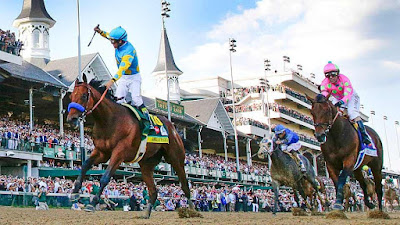It’s hard to quantify a feeling. It’s easy to quantify cold,
hard cash.
This February, the money bet on horse racing nationwide increased
6.4% compared to 2015 despite a reduction in the number of race days and
races. In March, total money bet rose
only slightly, but overcame dramatic decreases of 9% in race days and 8.5%
in races.
While numbers jumped across the board in 2015, it was widely
presumed that the American Pharoah effect would follow the equine star to the
breeding shed and 2016 would mark a return to the status quo.
Instead, all the hard work performed by the thoroughbred
industry over the past decade formed the foundation for a springboard in
2016. As Nyquist blistered down the stretch at Churchill Downs, the sport
was actually prepared to take advantage.
It’s been a remarkable decade for the sport, which reached
its nadir in 2006 following the death of Barbaro and a string of high-profile
injuries and drug controversies.
The depths horse racing had plummeted were revealed this
past Friday afternoon, as NBCSN replayed the 2009 Kentucky Oaks. That
race, won by Rachel Alexandra in breathtaking fashion, aired on Bravo. Yes,
that Bravo. And no, I don’t think they’ve aired a horse race since. It was
almost an after-thought; a hastily scheduled show that likely produced a
viewership measured in five digits.
The irony of the Oaks replay was when it was aired – during
six hours of live NBCSN coverage of the 2016 Kentucky Oaks, featuring Rachel
Alexandra’s daughter Rachel’s Valentina.
Horse racing had been steadily preparing for a return to the
mainstream, driven by the confluence of cable television and online gambling.
In particular, online betting is the future of the sport. While many states once
had restrictions, those are slowly being reduced. On XpressBet.com, a popular
site that gets wide promotion during nationally televised horse races, only 11 states completely
restrict wagering.
But online gambling is only good if people can watch the
races. While TVG exists to serve the railbird handicapper, the casual fan is
not tuning in. For them, horse racing needs to be brought to them.
This is where cable television swoops in to further aid the
sport. In recent years, Fox Sports 1 aired
select races that helped. Most importantly, NBC has made a significant
investment in the sport. This past Friday and Saturday, they aired more than 13
hours of live horse racing coverage. Even more importantly, they actually
showed other horse races.
For years, it had been frustrating to watch NBC profile
Derby hats as Grade 1 races went on, untelevised, in the background. This year,
NBC showed every undercard race in its entirety and handicapped each race. Finally,
NBC was treating the audience smartly – it was a welcome change from past years
and the “Horse Racing 101” approach.
Still, the sport needed a catalyst and American Pharoah was
that and then some. If you were brought to horse racing in 2015 because of the
Triple Crown winner, you were exposed to the absolute best that the sport had
to offer.
Not only did you follow the exploits of a legendary star,
you were exposed to the grand sport of horse racing. You were introduced to
Monmouth Park, Saratoga and Keeneland. You learned about the Haskell, the
Travers and the Breeders. You met Bob Baffert and Victor Esponiza.
The biggest obstacle for horse racing in attracting casual,
mainstream fans is that the “big horse” doesn’t always win. For all of 2015,
American Pharoah flipped that script, producing jaw-dropping performances. Even
his loss only enhanced Saratoga’s reputation as the Graveyard of Favorites and
added a layer of intrigue to his Breeders
Cup coronation, which was a smashing
ratings success.
American Pharoah didn’t just introduce horse racing to
millions that used to ignore the sport after the Belmont Stakes ended, he
introduced the very
best version of horse racing to millions. That’s why the number of
foals increased. That’s why yearling sales are
up.
The sport of horse racing never died. In fact, it was
improving. The problem was no one noticed. American Pharoah shone a bright
spotlight at the perfect time because it was finally ready for a close up.
The possibilities for 2016 are unlimited. Beholder returned
on Sunday and is the best mare in training since Zenyatta. California Chrome
dominated the Dubai World Cup in March and is the best older horse in training since
Curlin. Nyquist blew away the Kentucky Derby field and is the best Derby
winner since, well, okay that wait hasn’t been as long.
The Breeders Cup Classic is very, very far away, but we
already have three superstars identified for that race before the Preakness. In
some years, there were no stars at all.
Conventional wisdom said a Triple Crown winner wouldn’t
instantly thrust the sport back into the mainstream. Conventional wisdom was
wrong.

Comments
Post a Comment